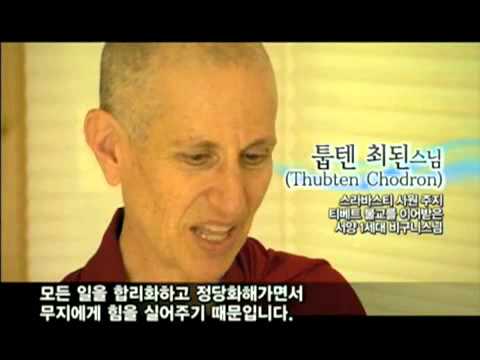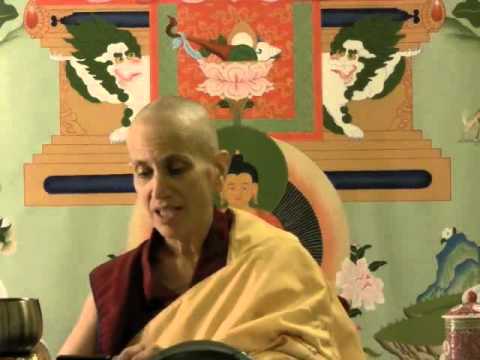How Buddhism differs from psychology
Part of a series of interviews by Buddhist Television Network.
Interviewer: A little while ago, you mentioned psychology. I want to ask you about that relationship. People often go to psychotherapists for extended periods of time, based on what I don’t know, but culturally we feel it’s an extended period of time. What is the relationship between Buddhism and psychology like in America? You brought it up…
Venerable Thubten Chodron (VTC): First of all, I think there are many overlaps, but I also think they’re two distinct disciplines. Psychology is aimed at helping you live a better life this life. Buddhism is helping you get out of the cycle of existence altogether. They have two very different goals. Making this life more harmonious and better relationships is a very good goal but getting out of the cycle of existence altogether is a much greater, more expansive goal. That’s that long-term vision that makes it a spiritual practice. Of course, in getting yourself out of samsara, you have to deal with many of your psychological issues. In terms of their goal, it’s different. In terms of the methodology, it’s also different. When you see a therapist, it’s usually one on one or maybe a small group, and you talk about your story, and you talk about your feelings and your story and your childhood and how people treated you as a child and how you reacted, and you express all this emotion.
What was so interesting for me in Buddhism is my teachers were not interested at all in my story. I was so attached to my story, and I wanted to hear my Tibetan teachers. First of all, they teach in a group, so I can’t tell my story in a group because my teachers are teaching all the time. When I go see them individually, they aren’t interested in my story. They want to know what are the mental states that I’m having trouble with, and then they’ll help me deal with those mental states.
Sometimes in that you have to talk a little bit about your story. I find with the people I help, sometimes they will tell me parts of their story, but I also have to help them get over identifying with that story because we cling to that story. We create an identity out of it. Whatever our story was, that identity is part of the self-grasping ignorance that keeps us bound in cyclic existence. Somehow, we can get really into it, even to the extent where we start psychologizing on the meditation cushion. Then, instead of actually doing the practice that the teacher is teaching, we start thinking about our childhood and this and that and the inner child and all these kinds of things.
I actually think that if somebody has a lot of those issues, psychologists are trained to help with that, and they should go to a psychologist for that. Buddhist practice can be helpful, and it would be an adjunct, but psychology has more specialization in that. I think they should use the expertise of the therapist.
Interviewer: These two disciplines are not for merging, in your estimation.
VTC: I don’t think they should merge. I think there’s some overlap. I think there are some areas where they can help each other and complement each other, but I think it’s very important that they’re kept separate because otherwise, to make Buddhism more acceptable for everybody, then we drop the Buddhist world view, which means we stop challenging the whole identity of I and self. If we stop challenging that, then there’s no way to free ourselves from the ignorance that binds us in samsara. There’s no way to realize the emptiness of inherent existence. There’s no way to see the ultimate truth.
Venerable Thubten Chodron
Venerable Chodron emphasizes the practical application of Buddha’s teachings in our daily lives and is especially skilled at explaining them in ways easily understood and practiced by Westerners. She is well known for her warm, humorous, and lucid teachings. She was ordained as a Buddhist nun in 1977 by Kyabje Ling Rinpoche in Dharamsala, India, and in 1986 she received bhikshuni (full) ordination in Taiwan. Read her full bio.


